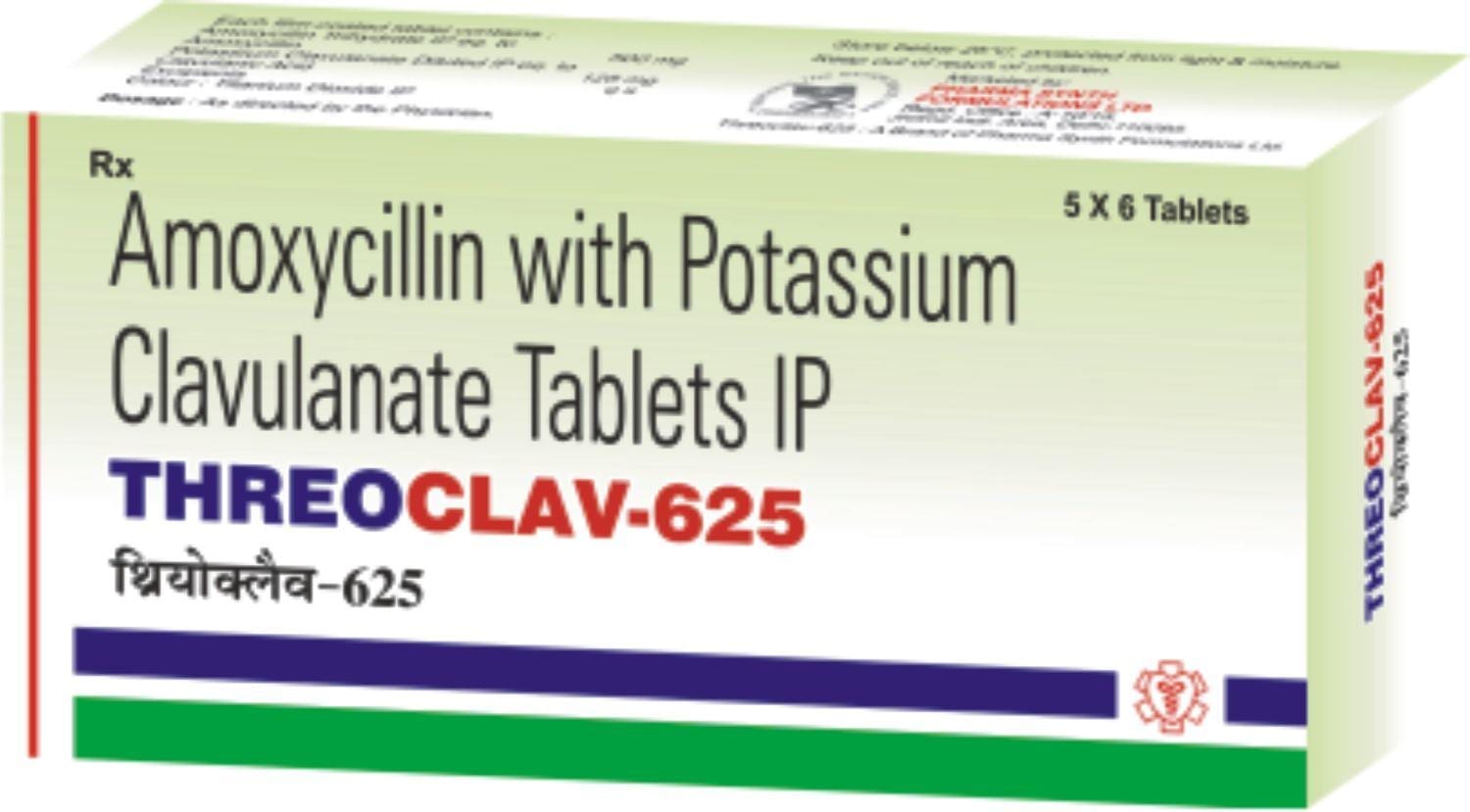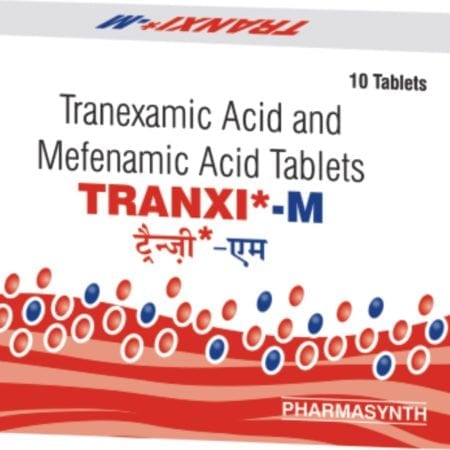Threoclav-625 Tabs
Each film-coated tablet contains:
» Amoxycillin Trihydrate IP eq. to Amoxycillin 500 mg
» Potassium Clavulanate Diluted IP eq. to Clavulanic Acid 125 mg
» Excipients q.s.
Description

![]()
Composition:
Each film-coated tablet contains:
Amoxycillin Trihydrate IP eq. to Amoxycillin: 500 mg
Potassium Clavulanate Diluted IP eq. to Clavulanic Acid: 125 mg
Excipients: q.s.
Dosage form:
Tablets
ATC classification:
Antibacterials for systemic use
Description:
Threoclav-625 tabs is for the treatment of gram positive and gram negative bacterial infections by microorganisms that are known to have developed resistance to amoxycillin, a broad spectrum semi-synthetic penicillin. The combination of amoxycillin with clavulanic acid is sensitive against the strains of bacteria which have developed resistance to β-lactam antibiotics by producing β-lactamase enzymes. Clavulanic acid inactivates these β-lactamase enzymes thus making the bacteria sensitive to amoxycillin.
Pharmacological action:
Amoxycillin, a beta-lactam antibiotic, inhibits bacterial cell wall synthesis by binding to one or more penicillin-binding proteins (PBPs). These proteins are located in the bacterial inner cell membrane and serve in cell wall synthesis by cross-linking peptidoglycan chains that give strength and rigidity to the bacterial cell wall. Penicillins inactivate the transpeptidase enzyme involved in cross likning of peptidoglycan chains by acylating the C-terminal domain of enzyme. The result of amoxycillin binding to PBPs is the formation of a defective cell wall that is osmotically unstable.
Clavulanic Acid isolated from Streptomyces is a semisynthetic beta-lactamase inhibitor. It contains a beta-lactam ring and binds strongly to beta-lactamase at or near its active site, thereby irreversibly inhibiting the enzymatic activity. This protects the activity of the beta-lactam antibiotics given in conjunction with clavulanic acid from beta-lactamase catalysis. It also restores and enhances the activity of the beta-lactam antibiotics.
Threoclav-625 has been shown to be active against most isolates of the following microorganisms both in-vitro and in clinical infections:
Aerobic Gram-Positive Microorganisms:
Streptococcus pneumonia
Aerobic Gram-Negative Microorganisms:
Haemophilus influenzae (including β-lactamase–producing isolates)
Moraxella catarrhalis (including β-lactamase–producing isolates)
Microbiological tests have reported greater in-vitro activity of amoxycillin against S. pneumoniae than does ampicillin or penicillin. It has also been found that majority of S.pneumoniae strains with intermediate susceptibility to ampicillin or penicillin are fully susceptible to amoxycillin and Threoclav-625
Pharmacokinetics:
Amoxycillin and Clavulanic acid are well absorbed from the gastrointestinal tract after oral administration. When taken with food absorption of clavulanic acid is found to be relatively greater to the fasted state whereas food has no effect in absorption of amoxycillin. Amoxycillin shows resistance to gastric acid facilitating higher serum levels after oral administration. The active ingredients of Threoclav-625 are not highly protein-bound, diffusing readily into the body tissues with the exception of the brain and spinal fluid. Diffusion of amoxycillin into brain and spinal fluid is seen when meninges are inflamed.
More than 50% of an orally administered dose of amoxycillin is excreted in the urine within 6 to 8 hours with detectable serum levels up to 8 hours after oral administration. The biological half-life of amoxycillin is 61.3 minutes.
Indications:
- Infections caused by Amoxycillin sensitive microorganisms.
- Lower Respiratory Tract Infections caused by β-lactamase–producing strains of Haemophilus influenzae and Moraxella catarrhalis.
- Otitis Media caused by β-lactamase–producing strains of Haemophilus influenzae and Moraxella catarrhalis.
- Sinusitis caused by β-lactamase–producing strains Haemophilus influenzae and Moraxella catarrhalis.
- Skin and soft tissue infections caused by β-lactamase–producing strains of S. aureus, E. coli, and Klebsiella spp
- Dental infections
Note: Mixed infections caused by ampicillin-susceptible organisms and β-lactamase–producing organisms which are susceptible to Amoxycillin/Clavulanic acid combination do not require the addition of another antibiotic.
Dosage and Administration:
Usual dosage unless otherwise specified by Physician:
For adults weighing 40 kg and over: 1 tablet 3 times a day.
For children weighing 40kg and over and who are above 12yrs of age: 1 tablet 3 times a day.
NOTE: ThreoClav-625 tablets are not suitable for children weighing less than 25 kg. Physician’s advice is needed for prescribing dosage of threoclav-625 to children weighing less than 40 kg.
For Children weighing less than 40 kg and Children aged 6 years or less should preferably be treated with ThreoClav dry syrup
Directions of use:
- Swallow the tablets whole with a glass of water at the start of a meal or slightly before to minimize potential gastrointestinal intolerance.
- Tablets can be broken into 2 halves along the score line to make them easier to swallow. Take both pieces of the tablet at the same time.
- Space the doses of ThreoClav-625 evenly during the day, at least 4 hours apart. Do not take 2 doses in 1 hour.
- Do not take ThreoClav-625 for more than two weeks. Consult your doctor if you still feel unwell.
Contraindications:
- ThreoClav-625 is contraindicated in patients with a known hypersensitivity to beta- lactam antibiotics e.g., Penicillins and Cephalosporins.
- ThreoClav-625 is contraindicated in patients with a previous history of amoxicillin/clavulanic acid associated jaundice/hepatic dysfunction.
- Ampicillin-class antibiotics should not be administered to patients with mononucleosis as there are high chances of them developing erythematous skin rash
Side effects:
Very common side effects with ThreoClav-625 tabs:
- Diarrhoea (in adults)
Common side effects with ThreoClav 625 tabs:
- Thrush Candidiasis (a yeast infection of the vagina, mouth or skin folds)
- Feeling sick (nausea), especially when taking high doses. In such cases it is advisable to take ThreoClav 625 tabs before food.
- Vomiting
- Diarrhea (in children)
Stop the medication and Contact a doctor immediately if you get any of these symptoms:
- Skin rash
- Vasculitis, inflammation of blood vessels which is manifested as red or purple raised spots on the skin and also other parts of the body
- Fever, muscle and joint pain, fatigue swollen glands in the neck, armpit or groin
- Swelling, sometimes of the face or mouth (angioedema), causing difficulty in breathing
- Collapse
- Convulsions
- Jaundice like symptoms
- Watery diarrhea usually with blood and mucus, stomach pain and/or fever due to inflammation of large intestine.
Warnings and Precautions:
General:
- Patients are to be tested for the following before prescribing ThreoClav-625:
- glandular fever
- liver or kidney problems
- To maintain efficacy and to prevent the development of drug resistant strains ThreoClav-625 should be used only to treat or prevent infections that are proven or strongly suspected to be caused by bacteria.
- Mild diarrhea to fatal colitis known as Clostridium difficile associated diarrhea (CDAD) have been reported with use of nearly all antibacterial agents, including amoxicillin. If CDAD is detected or confirmed, ongoing therapy with ThreoClav-625 tabs not directed against C. difficile may need to be discontinued. Appropriate fluid and electrolyte management, protein supplementation, antibiotic treatment of C. difficile, and surgical evaluation should be indicated for the patient.
Drug Interactions:
The following drugs are known for having drug interactions with ThreoClav-625 tabs:
- Probencid
- Oral contraceptives
- Allopurinol
Pregnancy:
ThreoClav-625 should be used during pregnancy only if clearly needed. As with other medications, its use is to be avoided in first trimester.
Lactation:
ThreoClav-625 may be administered to the lactating mothers. There may be a risk of sensitization as trace quantities of drug are excreted into the breast milk.
Information to be shared with Patients:
ThreoClav-625 should only be used to treat bacterial infections. It does not treat viral infections (e.g., the common cold). Though it is common to feel better early in the course of therapy, skipping of doses or not completing the full course of therapy decreases the effectiveness of the treatment and may also lead to development of resistance by bacteria which makes the infection not treatable by ThreoClav-625 or other antibacterial drugs in the future.
Patients should contact their physician immediately if they develop watery and bloody stools (with or without stomach cramps and fever) after starting treatment with antibiotics or even as late as two or more months after having taken the last dose of the antibiotic.
References:
https://www.fda.gov/
Amoxycillin
https://pubchem.ncbi.nlm.nih.gov/compound/amoxicillin#section=Pharmacology-and-Biochemistry
CLAVULANIC ACID
https://pubchem.ncbi.nlm.nih.gov/compound/Clavulanate#section=Pharmacology-and-Biochemistry
Disclaimer:
- Information provided above is for reference purpose only and has been compiled for use by healthcare practitioners. Please consult your physician to understand how the product affects you, its dosages, side-effects and further information.
- Remember, keep this and all other medicines out of the reach of children, never share your medicines with others, and use this medication only for the indications prescribed by your physician.
- Every effort has been made to ensure that the information provided by Pharma Synth Formulations Ltd. (‘PSFL’) is accurate, up-to-date, and complete, but no guarantee is made to that effect. PSFL does not endorse drugs, diagnose patients or recommend therapy and is an informational resource designed to assist licensed healthcare practitioners in caring for their patients and/or to serve consumers viewing this service as a supplement to, and not a substitute for, the expertise, skill, knowledge and judgment of healthcare practitioners. PSFL does not assume any responsibility for any aspect of healthcare administered with the aid of information provided. The information contained herein is not intended to cover all possible uses, directions, precautions, warnings, drug interactions, allergic reactions, or adverse effects. If you have questions about the drugs you are taking, check with your doctor, nurse or pharmacist.




